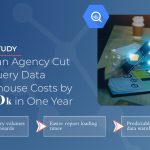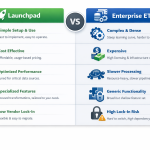
Data is the fuel that powers so much of what businesses do. As a result, the way a company sets up its data pipeline plays a huge role in the company's success. Making the right decisions about your analytics stack can increase reliability, accuracy, and insight while lowering costs and resources.
One of the first — and most difficult — decisions for companies is choosing whether to use an off-the-shelf ETL tool or opt for custom-built API and data warehouse integrations. Each solution has its pros and cons, and there are situations that favor one over the other.
The good news is that for many organizations, ETL tools offer significant advantages that make them an easy choice. However, it's still important to look at what each approach has to offer and determine which one is best for your business.
What Is ETL?
If a business wants to use data to guide the way it operates, then it will need to use the ETL process. ETL stands for extract, transform, and load. Specifically, it means extracting data from various sources, transforming it to fit operational needs, and loading it into a data warehouse.
This allows businesses to gather data such as website analytics, social media activity, e-commerce orders, and ad performance. The data from these various sources is then transformed into a consistent format that provides the information most important to them. Along the way, the data is often used to generate automated reports that keep stakeholders up to date. Finally, the data is added to historical records that can reveal trends and guide future business decisions.
We discussed this previously in a more in-depth article here: What is an ETL?
The Custom-Built Approach
In the past, as new data sources and storage options emerged, businesses needed to build their own API and data warehouse integrations to connect to them. Even today, some organizations require a custom-built solution tailored to their specific requirements.
This might be needed for a business to keep full control over their codebase and data pipelines rather than leveraging third-party solutions. Others might need to adapt to niche use cases, like working with less common or abnormal data sources and storage options that are unique to their industry. A custom solution might also be required to be compatible with older, legacy systems.
Unfortunately, there are quite a few barriers involved with this approach that have traditionally kept many organizations from unlocking the full power of their data. First of all, it requires additional resources, notably the technical expertise and time needed for initial designing, building, and testing, as well as for ongoing maintenance and updates. Additionally, the complexity that usually comes with a custom solution adds more things that can go wrong and makes scaling more difficult.
The Advantages of Using ETL Tools
ETL applications provide a newer alternative that has revolutionized analytics. These powerful tools offer an all-in-one, no-code solution that streamlines data integration and automates the entire ETL process. This enables businesses to get the most out of their data without needing endless resources and expensive infrastructure.
Time Efficiency
One of the great advantages of ETL applications, for businesses that don't need custom solutions, is that they can be set up quickly and start gathering data right away. Many ETL applications, like Launchpad, come with pre-built integrations for the most sources for website analytics, social media data, e-commerce activity, ad performance, and more.
Cost-Effectiveness
ETL applications are generally more cost-effective than custom-built solutions, both up-front and over time. Initial development costs are reduced because you don't need to build and maintain everything in-house. Easier maintenance, updates, and scalability also help reduce TCO (total cost of ownership).
Scalability and Flexibility
ETL platforms need to serve a wide variety of businesses and industries, so they generally offer scalability and flexibility that aren't possible with custom solutions. This helps businesses adapt to new data sources and business requirements. Users have a wide variety of pre-built integrations to take advantage of, and the platforms are already set up to handle large amounts of data.
Data Quality and Governance
Leveraging an established ETL platform is often the best way for businesses to ensure proper data governance. Data governance covers an organization's systems, processes, and standards around data use, management, security, and compliance. Many ETL applications boast built-in tools for data validation and quality checks, as well as compliance features that make auditing easier.
Support and Maintenance
By using an ETL application to automate their data pipeline, businesses are able to enjoy the support and maintenance services those platforms provide. Access to vendor support can reduce the burden on your internal teams and ensure quick resolutions when issues arise. ETL tools are also regularly updated to keep up with new technologies and data sources. That allows users to enjoy the latest capabilities without needing to implement them into their own custom analytics stacks.
The Bottom Line
Deciding between using an off-the-shelf ETL tool and building out custom API and data warehouse integrations can be daunting. Thankfully, for most organizations, the choice is often pretty clear. Unless there are specific, unavoidable reasons that call for a custom-built solution, then businesses should take advantage of off-the-shelf ETL tools. From reducing costs, time, and effort to increasing accuracy, reliability, and flexibility, ETL applications offer businesses a great way to optimize their analytics.
Curious? Try Launchpad for Free
Launchpad offers all the benefits and conveniences of the latest ETL technology. Even better, the free trial allows you to experience it all for yourself. Let the Calibrate team show you how easy it is to optimize and automate your workflows and start seeing immediate results.





